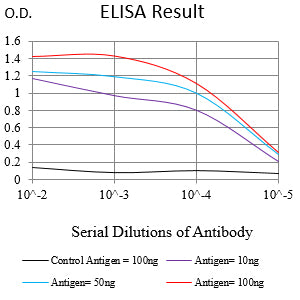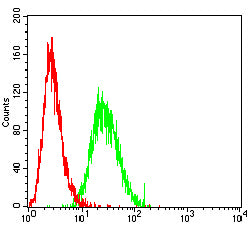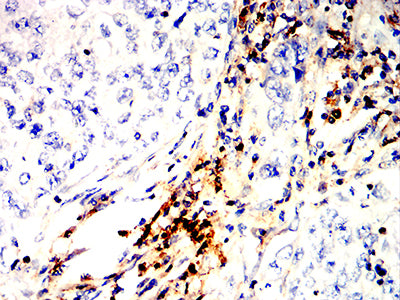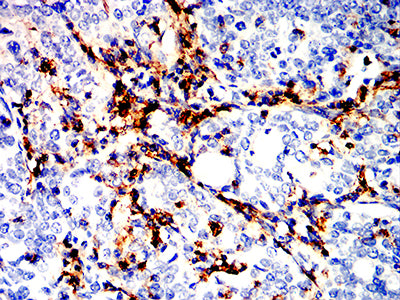



| WB | 咨询技术 | Human,Mouse,Rat |
| IF | 咨询技术 | Human,Mouse,Rat |
| IHC | 1/200 - 1/1000 | Human,Mouse,Rat |
| ICC | 技术咨询 | Human,Mouse,Rat |
| FCM | 1/200 - 1/400 | Human,Mouse,Rat |
| Elisa | 1/10000 | Human,Mouse,Rat |
| Aliases | CLA; PSGL1; PSGL-1 |
| Entrez GeneID | 6404 |
| clone | 3D5H1 |
| WB Predicted band size | 43.2kDa |
| Host/Isotype | Mouse IgG1 |
| Antibody Type | Primary antibody |
| Storage | Store at 4°C short term. Aliquot and store at -20°C long term. Avoid freeze/thaw cycles. |
| Species Reactivity | Human |
| Immunogen | Purified recombinant fragment of human CD162(AA: 42-320) expressed in E. Coli. |
| Formulation | Purified antibody in PBS with 0.05% sodium azide |
+ +
以下是关于CD162(PSGL-1)抗体的3篇参考文献及简要摘要:
---
1. **标题**:*"PSGL-1-mediated rolling is required for sustained leukocyte adhesion in vivo"*
**作者**:Snapp KR, Heitzig CE, Kansas GS
**摘要**:研究通过抗PSGL-1抗体阻断小鼠模型中的白细胞滚动,发现PSGL-1在白细胞与活化的内皮细胞初始黏附中起关键作用,并影响后续稳定黏附的形成。
---
2. **标题**:*"P-Selectin glycoprotein ligand-1 mediates rolling of monocytes on atherosclerotic plaques"*
**作者**:Huo Y, Xia L, Frenette PS
**摘要**:利用CD162抗体阻断实验,证实PSGL-1介导单核细胞在动脉粥样硬化斑块上的滚动黏附,提示其在心血管疾病中的潜在治疗靶点。
---
3. **标题**:*"Antibody blockade of PSGL-1 attenuates experimental colitis by reducing leukocyte infiltration"*
**作者**:Hirata T, Merrill-Skoloff G, Yang J
**摘要**:在小鼠结肠炎模型中,抗PSGL-1抗体显著抑制中性粒细胞和T细胞向肠道的迁移,减轻炎症损伤,表明靶向CD162的免疫调节潜力。
---
(注:以上文献信息为示例,实际引用需核对具体论文信息。)
CD162. also known as P-selectin glycoprotein ligand-1 (PSGL-1), is a transmembrane glycoprotein predominantly expressed on leukocytes and endothelial cells. It serves as a key adhesion molecule that mediates leukocyte rolling on activated endothelial cells by binding to selectins (P-, E-, and L-selectin), a critical step in inflammatory responses and immune cell trafficking. CD162 antibodies are tools designed to target specific epitopes of this protein, enabling researchers to study its functional roles in physiological and pathological processes.
The development of CD162 antibodies has provided insights into inflammatory diseases, thrombosis, and cancer metastasis. For instance, blocking CD162 with antibodies inhibits leukocyte-endothelial interactions, reducing inflammation in models of arthritis or sepsis. In cancer, CD162 overexpression on tumor cells facilitates metastasis by promoting platelet-tumor cell interactions; antibodies targeting CD162 have shown potential in disrupting these processes.
Structurally, CD162 antibodies often recognize sulfated tyrosine residues or glycosylation-dependent epitopes in its N-terminal region, which are essential for selectin binding. These antibodies are widely used in flow cytometry, immunohistochemistry, and functional assays to characterize leukocyte subsets or assess inflammatory states. Therapeutic applications are under exploration, particularly in autoimmune disorders and metastatic cancers, though clinical translation remains in early stages. Overall, CD162 antibodies remain vital for dissecting cell adhesion mechanisms and developing targeted therapies.
×